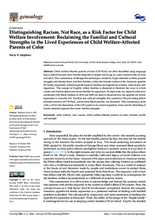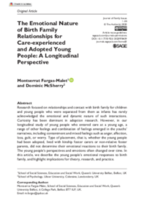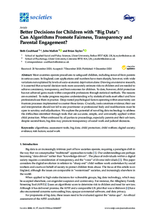This section highlights resources focused on the participation of parents and caregivers in decisions about children's care, including decisions about their own children and their placement in alternative care, as well as advocacy efforts to reform systems of care and protection for children.
Displaying 21 - 30 of 98
This article explores the possibilities of a systemic approach in the support of parents whose children are placed in public care.
This commentary challenges the stereotypes created by hyper-attention to the struggles of child welfare-affected parents of color (CW-PaoC) and situates them, and their families, within the broader context of the American appetite for family separation, wherein specific types of families are targeted for scrutiny, intervention and regulation.
The New Neighborhood is a limited series podcast that explores some of the dramatic changes taking place across the U.S. as people work to reinforce a sense of community, support young children and families, and work to build equity within communities.
This article describes the benefits of monthly family team meetings for parents involved with child welfare. Findings are shared from semi‐structured, qualitative interviews conducted with 17 parents whose children had been placed in substitute care.
In this article, the authors describe young people’s emotional responses to birth family, and highlight implications for theory, research, and practice.
This secondary analysis involved exclusively parents with children placed in kinship care by a child welfare agency. It examined associations between parents’ receipt of needed services and 6 sets of variables measuring parents’ needs, access to service providers, social structural factors, demographic factors, family resources, and child welfare interventions experienced.
This article explores birth parents’ views on their needs and perceptions of support delivered by two different interventions: one offering support to individuals and the other providing a parental group.
This article examines the reasons that child protection has not achieved gains made within comparable professions through statistical methods.
This paper reports on the results of an online survey of P2P stakeholders regarding: How text‐based support is being used in P2P programs and whether text‐based support is perceived as providing benefits to parents of children with disabilities.
The current study seeks to address the lack of literature including voices of mental health clinicians regarding their work and clients in the child welfare system by exploring clinicians’ views on the issue of child maltreatment and CPS-involved parents’ parenting.



